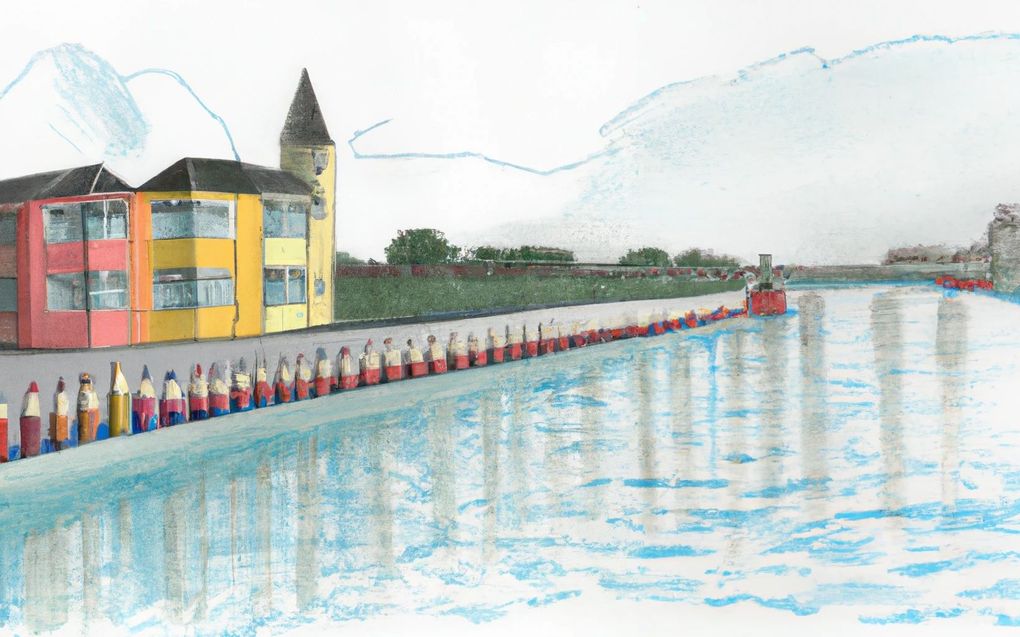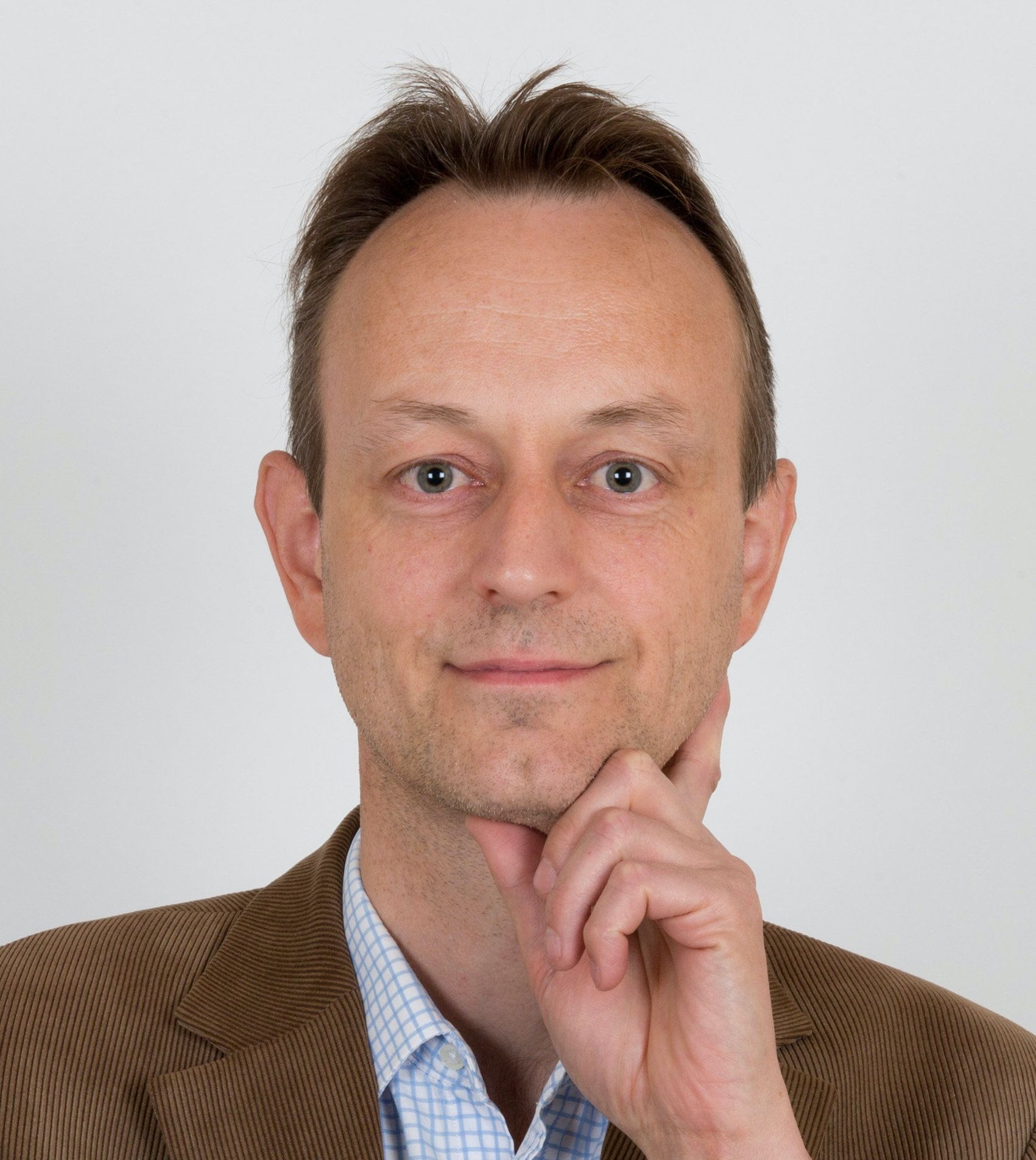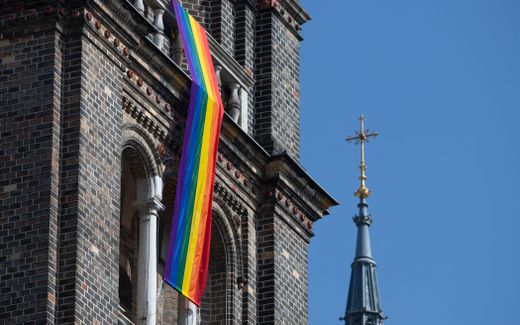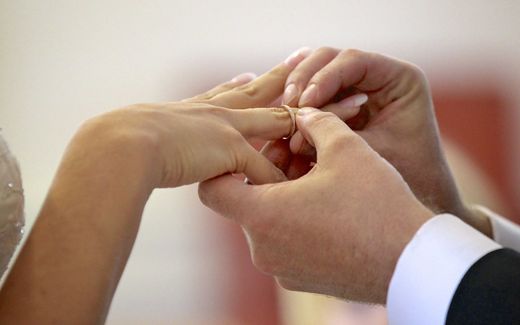Evert's review: Christians can profit from Fukuyama's defence of liberalism

The house is private property. But the water is a public good. From a liberal perspective, the house should be protected against the water by the public authorities. Picture Dall-E/CNE
Opinion
You buy a house on the free market. To live in it, your property rights must be protected. The market cannot do that. It takes the state to do so. And that, says Francis Fukuyama, is precisely the strength of the liberal order.
In chaos, there is no (property) law. Only the law of the jungle applies there. In many countries, it is still like this. The wealthiest man 'buys' the presidency and appoints judges who listen to him.
However, the economy can only flourish if citizens know that the house they buy really belongs to them. And there is an independent judge to rule on an unclear rule in the contract.
In his book "Liberalism and its discontents", Fukuyama discusses how this looks in the world.
Communism
The American political philosopher Francis Fukuyama became famous overnight in the early 1990s with "The End of History and the Last Man". His book became a classic.
The message was simple: after the demise of communism, liberal democracy had won for good. Most countries that had previously fought liberalism had moved towards liberal democracy when that book was published. Even former communist countries now adhere to the principles of liberalism, at least nominally.
Not remaining the man of one book, Fukuyama went on to write several ground-breaking works. Such as "State building" (2005) on the formation of a state apparatus and "Identity" (2018) on identity politics.
Hungary
On the first page of "Liberalism and its discontents", Fukuyama immediately provides a definition: liberal democracy is a state constrained by law. The executive power is limited and thus gives room to other powers –such as the judiciary– not to mention the citizen. Another word for this is the rule of law.
This all seems theoretical, but the example of house buying makes it clear how practical it is. According to the author, post-war economic development would not have been possible without this simple division of labour between the state and the market. If the state does not protect the legal right, the entrepreneur will not invest.
This judiciary must also be independent. In some countries, as a critical citizen, you don't want to appear before the courts because judges only say what the president wants to hear. In a liberal constitutional state, however, the judiciary should be free and can also go against the government. Of course, there are significant concerns about judicial independence: in Russia and Brazil, but equally in Hungary and Poland.
Christians also benefit from an independent judge. Only last year, several Christians were sued for statements on sexual ethics: Päivi Räsänen MP in Finland, pastor Olaf Latzel in Germany and the Rev. A. Kort in the Netherlands. In all these cases, courts ruled that the people were free to speak out for their beliefs. Had these judges been under political influence, the verdict might have differed.
Dykes
So, Christians benefit from liberal democracy. But to be honest, Christians have traditionally had a love-hate relationship with it. But fair is fair; Christians traditionally have a love-hate relationship with it. It were definitely not the Calvinists or the Jesuits who developed this vision from 1700 onwards, but enlightened philosophers like Montesquieu (1689-1755).
The core task of government was no longer to dictate to people what a "good life" was but to protect life itself by centralising and prioritising peace and security. The decision about good and evil from now on became the citizens' responsibility. The state, however, provided dykes and walls.
Fukuyama, therefore, resents that progressives today want to return to a government dictating norms and values, mainly around sexuality.
Earthquake
The question is whether Montesquieu would still recognise his vision in today's government. The modern state does much more than guard security. Or maybe it is the other way round: the government would rather be busy strengthening LGBT rights –even if that clashes with freedom of religion and expression– than investing in an excellent armed force. Until the Ukraine crisis, most armies in Europe were severely understaffed.
It is also questionable whether Montesquieu could have witnessed the government changing the definition of marriage. For centuries, the government was only regulating what already existed, namely the bond between man and woman. Opening marriage to people of the same sex is a step further, not to mention the polyamorous marriage of three or more people. That is changing reality itself. That can only be done with an expansive view of the state's duty (and power).
Weakness
This touches on an issue that Fukuyama sometimes touches on but does not address: that liberal democracy is something utterly different from cultural (or ethical) liberalism. In politics and media, it is easily said something like "abortion and democracy are linked". However, this needs to be corrected. Even ethically conservative people need not feel burdened to defend the liberal rule of law.
Fukuyama does call it a "weakness" of liberalism that there are no shared norms and values but does not elaborate on this. He pays much attention to neoliberalism's (economic) problems but leaves out the moral side. This is a flaw in his book. Nevertheless, it will be hard to find a second book on this topical subject that is so accessible and offers so much overview.
Francis Fukuyama: Liberalism and its discontents; published by Profile Books, 192 pages; available online for several prices.
Evert van Vlastuin (1972) has been working as a journalist from the early 90s.

He has interviewed several Nobel Peace Price winners as the former South African president F. W. de Klerk and two from Northern Ireland, John Hume and David Trimble.
From 2001, he worked as a foreign news reporter for the Dutch Reformed Daily. Since 2021, he works as managing editor for the start-up CNE.news.
Respond to Evert by e-mail.
Related Articles










